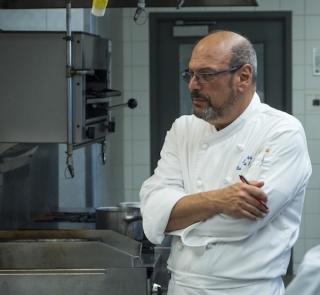
Buying Knives for Graduating Students
27 March 2020Guide to culinary school graduation gifts including knife and chef’s tool kit suggestions.
By Adam Weiner, JD, CFSE
Over the years I have written a number of articles that were designed for you, the teacher, to give to your students. This is the first of a kind for me. This article is designed for the parents of your graduating class. If you think it is appropriate, please provide them a copy or the link to this story. You are welcome to post it on any online system you have for providing information to parents or students.
Graduation is coming up and many students are getting ready to enter the working world. I know there are many parents who would like to buy knife sets for their soon-to-be-paid cooks. (Congratulations, the fact that they are being paid makes them professionals.) This article is designed as a buyers’ guide for any parent, friend or family member.
- In buying and using knives, the most important thing is the feel of each knife in the cook’s hand. It’s like buying shoes online for someone else. Unless you know what style and size and brand feels good to the person using the knives, your gift might not feel right. I know it ruins the surprise, but it might be better to take the student to help pick out the knives. Try to find a place, such as commercial knife stores or restaurant supply companies, where the students can handle the knife outside of the package. Again, the most important part in buying a knife is how it feels in the user’s hand.
- More expensive does not necessarily mean better. It’s like cars. A $100,000 car for a brand-new driver is probably not five times as useful as a $20,000 car. Furthermore, more expensive knives tend to “disappear” in the workplace. There are many great knives out there designed and manufactured for commercial purposes that can be bought for under $30 each. (For example, Mercer has some good entry bread knives for under $20 and several eight-inch chef knives for under $30.)
- Buy commercial knives, like knives from Mercer for example. DO NOT buy knives meant for home use. If you are not sure if they are commercial or not, look at the company’s website. That will answer the question for you.
- A good starting-set of knives includes:
- An eight- or 10-inch chef’s knife. New cooks might find the 10- inch a bit overwhelming
- Paring knife
- Bread or sandwich knife. I recommend the offset style.
- Utility knife. No, this not a box cutter but a specific professional knife.
The knives do not have to be a matching set. I have several knife kits and none of them have any knives that match. They are either from different manufacturers, different models, or different handles. Again, feel is the most important factor.
- REQUIRED cook’s accessories:
- Knife bag or not overly large toolbox
- Honing steel (without this the knives are useless)
- Knife guard for each knife. (Buy the snap-on plastic or magnetic type. The slide-on type tends to come off in the carrying case. Cardboard or paper guards are unsanitary and dangerous. Wrapping sharp knives in towels is looking for trouble.)
- Box cutter (to be used for opening boxes or cutting strapping tape instead of the good knives)
- Optional accessories:
- Instant read digital thermometer
- Spring-loaded tongs (no longer than 10 inches)
- Silicone spatulate (get one high heat resistant)
- Optional additional knives:
- Boning knife (rigid)
- Boning Knife (flexible)
- Carving Knife
- Shears (Look for shears where the two pieces come apart to facilitate cleaning and sanitizing.)
Note: Either get the knives engraved with the person’s names or initials or buy some really weird colored/patterned electrical or duct tape and put a strip of a tape on the handle.
Realize that these knives will not last forever. They will be lost, misplaced, stolen, or hopefully just wear out. I know many people want to buy graduation gifts that last a lifetime. A starter set of knives won’t. But, back to my car analogy from above: Cars that cost $20,000 won't last forever either.
Congratulations to the graduate. And, congratulations to you for helping support, motivate, and guide the graduate all these years. Oh yes, wish them the best for me.
[Note: When I first started writing this column, I wrote a multi-piece article on how to buy, maintain, hone, use and sharpen knives. The first of these articles was published in October of 2010. Although culinary students and teachers may wish to review those articles, they are beyond the scope of a nice graduation present from a friend, family member or parent.]
Adam Weiner, JD, CFSE, has been a culinary instructor in the San Francisco Bay Area for more than 16 years.
